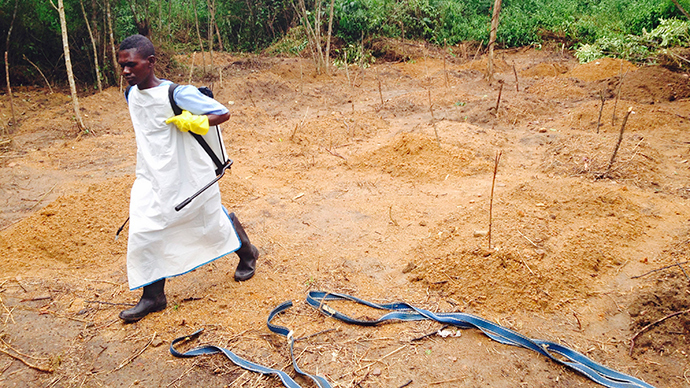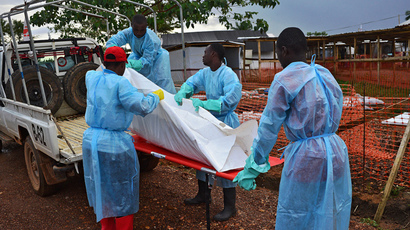All 365 of Sierra Leone’s Ebola-related deaths pinned on one healer

Sierra Leone’s Ebola crisis has been traced back to a single healer in an isolated border village, who had claimed to be in possession of special powers to cure the deadly disease that started penetrating the border, it has emerged.
“She was claiming to have powers to heal Ebola. Cases from Guinea were crossing into Sierra Leone for treatment,” top medical official, Mohamed Vandi, who was based in the crisis-struck Kenema district, told AFP.
“She got infected and died. During her funeral, women around the other towns got infected,” he told the agency. The woman was based in the eastern border village of Sokoma.
Mourners at the funeral of the healer prompted a chain reaction of sorts, and what was initially a more confined outbreak materialized into a severe epidemic when, in June, the virus struck a city of 190,000 called Kenema.
At least 1,350 people have died since the virus spread out of southern Guinea at the beginning of the year. More than 2,200 people have been infected across Guinea, Liberia, Sierra Leone and Nigeria.
The disease spreads through direct contact, for example through broken skin or bodily fluid exposure, and is characterized by fever and bleeding disorders, as well as vomiting, diarrhea and a rash.
There is no cure or vaccination for it, and 90 percent of cases result in death. Its severity and destructiveness to organ tissue has earned it the description of “molecular shark”.
In part, its rapid transference has been blamed on funeral rites, during which relatives touch their dead. Mourners, family members, and health workers are the most at risk in the event of an outbreak. Twelve nurses out of the 22 infected have died since the virus first hit Kenema.
“The nurses who lost their lives and those who got infected would never have gone in knowing that they would get infected,” Vandi, the district medical officer, told AFP.

Nurses have had difficulty securing satisfactory protection from the disease, with 100 nurses in a Sierra Leone hospital striking after complaining of poor management. Some staff told AFP that they had gone for weeks without a day off.
Sister Rebecca Lansana told the Guardian newspaper that she had been concerned over high staff deaths. “My family do not want me to come here anymore. They think I will die, they don’t want to be around me in case I give them Ebola,” she said back on August 9. Upon publication she had already been dead for five days.
Liberia has been forced to deploy security forces to contain the disease. Fifty-thousand residents of a Liberian slum were quarantined last night in an attempt to stem the spread of the disease through West Africa.
Over the weekend, potential patients fled a similar attempt. Armed soldiers and riot police have begun to block entry and exit points to the West Point neighborhood in Liberia.
In a week, Russian virologists will head to the Republic of Guinea to set up and run an Ebola research laboratory.
“We agreed with Guinean authorities that our specialists would work in the field and help in the fight against Ebola using special medical diagnostics,” immunology and virology laboratory head at St. Petersburg’s Pasteur Scientific Research Institute, Aleksandr Semyonov, told reporters on Wednesday.
Semyonov added that a vaccine has already been developed in Russia that has proven itself successful in preliminary trials. "We’ll see what happens next," Semyonov said.














